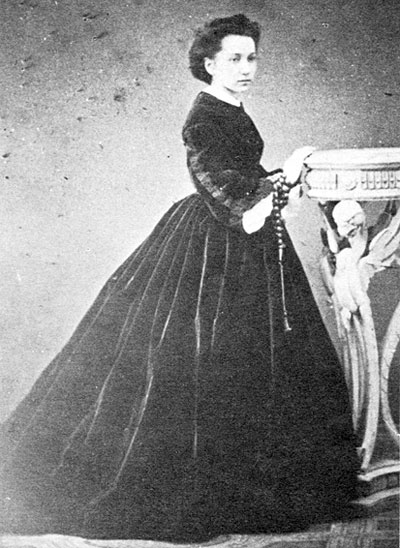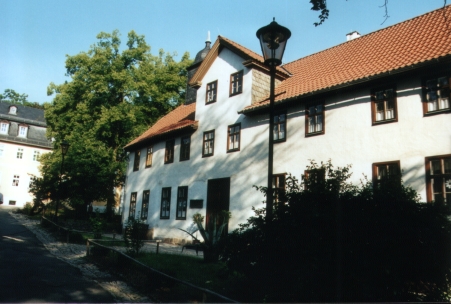|
Elena Raffalovich
Elena Raffalovich (1842-1918) was a Russian educator. A noted figure within the pioneers of the ''Kindergarten'', she was foremost active in Italy. Biography Elena Raffalovich was born on 22 May 1842 in Odessa. She was the third daughter of Leon and Rosette Lowensohn; her sisters were Marie and Nadine. In 1861, her family settled in Western Europe. In 1872, Raffalovich went to Florence, where she met Bertha von Marenholtz-Bülow. Marenholtz-Bülow was an adherent of Froebelism and introduced the philosophy to Raffalovich. Raffalovich attempted to found a kindergarten in Florence, to limited success. In 1873, Raffalovich founded the first Froebelian kindergarten in Venice. Raffalovich died on 29 November 1918. Family She married the scholar Domenico Comparetti on 13 August 1863. They had one daughter, Laura. Raffalovich and Comparetti separated in January 1872, possibly after she attempted suicide. She was the paternal great-grandmother of Lorenzo Milani Lorenzo Carlo Domen ... [...More Info...] [...Related Items...] OR: [Wikipedia] [Google] [Baidu] |
Kindergarten
Kindergarten is a preschool educational approach based on playing, singing, practical activities such as drawing, and social interaction as part of the transition from home to school. Such institutions were originally made in the late 18th century in Germany, Bavaria and Alsace to serve children whose parents both worked outside home. The term was coined by German pedagogue Friedrich Fröbel, whose approach globally influenced early-years education. Today, the term is used in many countries to describe a variety of educational institutions and learning spaces for children ranging from two to six years of age, based on a variety of teaching methods. History Early years and development In 1779, Johann Friedrich Oberlin and Louise Scheppler founded in Strasbourg an early establishment for caring for and educating preschool children whose parents were absent during the day. At about the same time, in 1780, similar infant establishments were created in Bavaria. In 1802, Princ ... [...More Info...] [...Related Items...] OR: [Wikipedia] [Google] [Baidu] |
Bertha Von Marenholtz-Bülow
Baroness Bertha von Marenholtz-Bülow (born 5 March 1810 in Brunswick; died 9 January 1893 in Dresden) was a German noblewoman and educator noted for her work in spreading the kindergarten concept through Europe. Biography Bertha was daughter of baron Georg von Bülow-Wendhausen and countess Amalie Marie von Wartensleben. She married baron Wilhelm von Marenholtz, whom she left in 1847 without getting divorced. She was attracted by the ideas of Friedrich Fröbel, whom she met in 1850. She became his disciple and devoted her life to founding kindergarten Kindergarten is a preschool educational approach based on playing, singing, practical activities such as drawing, and social interaction as part of the transition from home to school. Such institutions were originally made in the late 18th cen ...s in Germany and many other European countries. Works * ''Beiträge zum Verständnis Friedrich Fröbels'' (Contributions to understanding Friedrich Fröbel; 1876) She wrote a numb ... [...More Info...] [...Related Items...] OR: [Wikipedia] [Google] [Baidu] |
Friedrich Fröbel
Friedrich Wilhelm August Fröbel or Froebel (; 21 April 1782 – 21 June 1852) was a German pedagogue, a student of Johann Heinrich Pestalozzi, who laid the foundation for modern education based on the recognition that children have unique needs and capabilities. He created the concept of the ''kindergarten'' and coined the word, which soon entered the English language as well. He also developed the educational toys known as Froebel gifts. Biography Friedrich Fröbel was born at Oberweißbach in the Principality of Schwarzburg-Rudolstadt in Thuringia. A cousin of his was the mother of , and Henriette became a student of his. Fröbel's father, Johann Jacob Fröbel, who died in 1802, was the pastor of the orthodox Lutheran (alt-lutherisch) parish there. Fröbel's mother's name was Jacobine Eleonore Friederike (born Hoffmann). The church and Lutheran Christian faith were pillars in Fröbel's own early education. Oberweißbach was a wealthy village in the Thuringian Forest and ... [...More Info...] [...Related Items...] OR: [Wikipedia] [Google] [Baidu] |
Lorenzo Milani
Lorenzo Carlo Domenico Milani Comparetti (27 May 1923 – 26 June 1967) was an Italian Catholic priest. He was an educator of poor children and an advocate of conscientious objection. Biography Milani was born in Florence in 1923 to a rich middle-class family. His father, Albano Milani, and his mother, Alice Weiss, were staunch secularists. Alice Weiss was Jewish and a cousin of Edoardo Weiss, one of Sigmund Freud's earliest disciples and the founder of the Italian Psychoanalytic Association. Milani's paternal great-grandfather was Domenico Comparetti, a leading nineteenth-century philologist. In his own work as an educationist, Milani emphasized learning how to use words effectively. In June 1943, after a period of study at the Brera Academy, Milani converted from agnosticism to Catholicism, perhaps after a chance conversation with Don Raffaele Bensi, who later became his spiritual director. He also exchanged a complacency of the economically fortunate for solidarity with the poo ... [...More Info...] [...Related Items...] OR: [Wikipedia] [Google] [Baidu] |
1842 Births
Events January–March * January 6–January 13, 13 – First Anglo-Afghan War – Massacre of Elphinstone's army (Battle of Gandamak): British East India Company troops are destroyed by Afghan forces on the road from Kabul to Jalalabad, Afghanistan, by Wazir Akbar Khan, Akbar Khan, son of Dost Mohammad Khan (Emir of Afghanistan), Dost Mohammad Khan. * January 8 – Delft University of Technology is established by William II of the Netherlands, as a 'Royal Academy for the education of civilian engineers'. * January 23 – Antarctic explorer James Clark Ross, charting the eastern side of James Ross Island, reaches a Farthest South of 78°09'30"S. * January ** Michael Alexander (bishop), Michael Alexander takes office, as the first appointee to the Anglican-German Bishopric in Jerusalem. ** United States, American medical student William E. Clarke of Berkshire Medical College becomes the first person to administer an inhaled anesthetic, to facilitate a surgical procedure. ... [...More Info...] [...Related Items...] OR: [Wikipedia] [Google] [Baidu] |
1918 Deaths
The ceasefire that effectively ended the World War I, First World War took place on the eleventh hour of the eleventh day of the eleventh month of this year. Also in this year, the Spanish flu pandemic killed 50–100 million people worldwide. In Russia, this year runs with only 352 days. As the result of Julian to Gregorian calendar switch, 13 days needed to be skipped. Wednesday, January 31 ''(Julian Calendar)'' was immediately followed by Thursday, February 14 ''(Gregorian Calendar)''. Events World War I will be abbreviated as "WWI" January * January – 1918 flu pandemic: The "Spanish flu" (influenza) is first observed in Haskell County, Kansas. * January 4 – The Finnish Declaration of Independence is recognized by Russian Soviet Federative Socialist Republic, Soviet Russia, Sweden, German Empire, Germany and France. * January 8 – American president Woodrow Wilson presents the Fourteen Points as a basis for peace negotiations to end the war. * January 9 ... [...More Info...] [...Related Items...] OR: [Wikipedia] [Google] [Baidu] |
Emigrants From The Russian Empire
Emigration is the act of leaving a resident country or place of residence with the intent to settle elsewhere (to permanently leave a country). Conversely, immigration describes the movement of people into one country from another (to permanently move to a country). A migrant ''emigrates'' from their old country, and ''immigrates'' to their new country. Thus, both emigration and immigration describe migration, but from different countries' perspectives. Demographers examine push and pull factors for people to be pushed out of one place and attracted to another. There can be a desire to escape negative circumstances such as shortages of land or jobs, or unfair treatment. People can be pulled to the opportunities available elsewhere. Fleeing from oppressive conditions, being a refugee and seeking asylum to get refugee status in a foreign country, may lead to permanent emigration. Forced displacement refers to groups that are forced to abandon their native country, such as by e ... [...More Info...] [...Related Items...] OR: [Wikipedia] [Google] [Baidu] |






